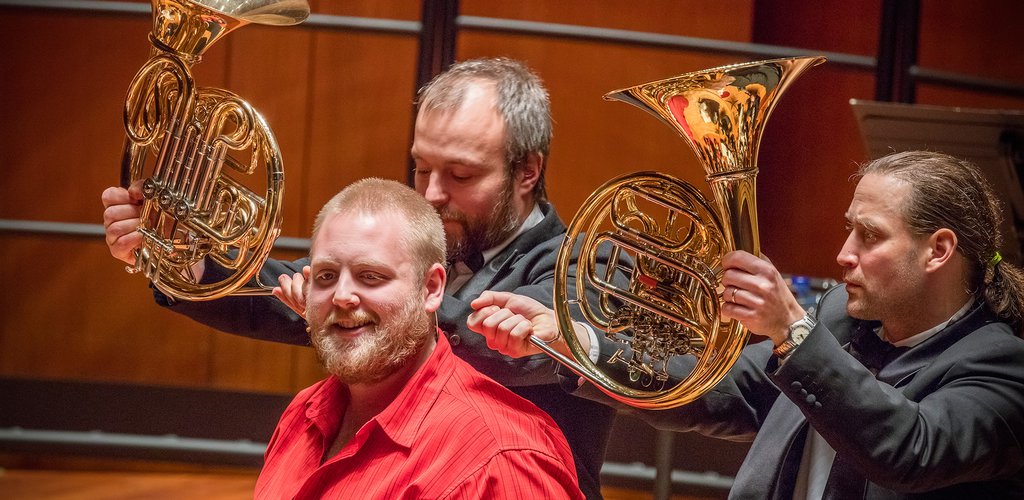In the hands of the Hungarian National Philharmonic Orchestra and Zoltán Kocsis, Schumann’s Second Symphony (in C major) was taken from restrained classicism to romantic passion The ostinato chorale of the first movement, which served as a kind of Hommage à Bach, didn’t allow for any approach other than restraint; within the movement, written in sonata form, the crescendo preceding the
poco vivace instruction and the increasingly-disciplined momentum of the
Allegro ma non troppo were especially memorable.
The first movement built up through increasing drift, snaring timpanis and unsettling brass, before climaxing in a triumphant fanfare that Kocsis and his orchestra structured brilliantly. During the second movement, Schumann stepped away from Bach, whose works he had studied before composing the symphony, but in the Trio section the B-A-C-H (Bb-A-C-B) motif still appears. The orchestra interpreted the movement, which is scherzo-like only in its tempo but not in its tone, with deep immersion and restlessness, before getting to the closure with bold, sweeping string passages. The Adagio espressivo, which uses a contrapuntal midsection to give yet another nod to the baroque master, is one of the most beautiful movements in romantic music and it was played with inspired melodiousness, delicately-shaped legatos and melodies. Naturally, the crowning achievement was the finale (Allegro molto vivace). The Hungarian National Philharmonic Orchestra’s music encompassed all the peaks and troughs of the symphonic genre. It was in this movement that the composer banished his demons through a Beethoven love song.
Michael Gees must be a regular at shooting galleries, or have a sizeable boxing bag in his living room, because as he sat down at the piano in the Festival Theatre to accompany the soprano Anna Lucia Richter, there was no tension in him whatsoever, meaning he could drown himself in Schumann’s song cycles. That said, he played the first two pieces of the
Fünf Lieder (Op. 40) extraordinarily softly, and only emphasised the piano sound during the third song (
Der Soldat). The last piece of the short cycle,
Verrathene Liebe, which ends ethereally, sounded especially fresh.
Gees looked more like a jazz pianist who was sent on stage with a pile of classical scores. His playing was indescribably light; he was carefree and relaxed beyond words. Yet he was precise and well-polished, with sensitive accents that gave an excellent base to Anna Lucia Richter’s singing; her brilliant and lively vocals were reminiscent of a young singer, but her voice was intimately coloured and clearly focused at the same time. The Op. 39 cycle
Liederkreis was similar. Gees practically turned the Schumann score into impressionist exhibits, his crescendos were short but substantial, and Anna Lucia interpreted the poems with a damsel-like charm and well-placed gestures. Their collaboration gave a valid, if not exclusive, interpretation.
The All-Star game of the night belonged, of course, to Iván Fischer’s Festival Orchestra and the Pro Musica Girls’ Choir, who did an ambitious rendering of Shakespeare’s
A Midsummer Night’s Dream. This time, instead of Mendelssohn’s opus serving as incidental music to the play, the prevalence of the music was lessened by dramatic intermissions. Students from Budapest’s University of Theatre and Film took the work to the concert stage with refreshing humour and spirit. The young acting students shared the stage with the musicians, becoming a source of more jokes: Bottom’s donkey ears were substituted for two horns, a violin bow served excellently as a sword, and Fischer’s baton was borrowed on many occasions by the more impudent ones. Noteworthy features included a short but surprising Latinovits parody and the somewhat superfluous monologue by Helena, which was nonetheless delivered with a fine English accent.
The overture’s vibrant quavers on the strings, and its dynamics shaped by light accents, proved the orchestra deserving of their fame. The short breath before the downwards twelfth leap, performed with a slight
glissando, must have been be a memorable moment for everyone. For me, only the
Wedding March left something to be desired – but such is the fate of over-performed pieces. Besides Anna Lucia Richter, another singer, Nora Fischer, had the role of mezzosoprano. Their contrasting voices complemented each another tremendously.
The Marathon concluded with Puck saying “so good night unto you all. Give me your hands if we be friends!” The National Concert Hall responded to his request with a loud ovation.
READ THE ORIGINAL ARTICLE VIA FIDELIO (IN HUNGARIAN).

